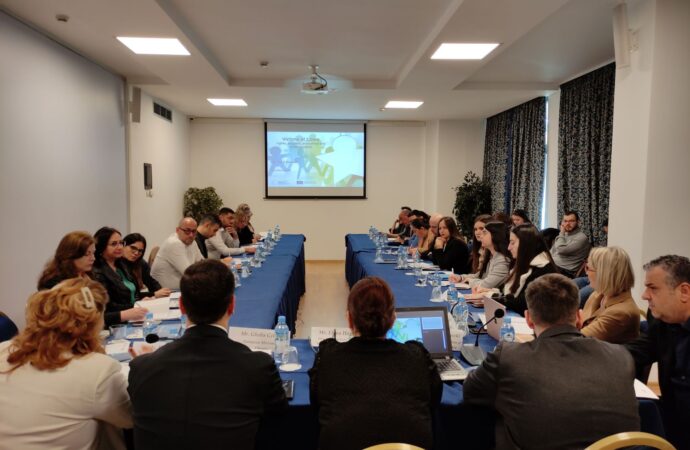On March 30, 2023, the European Movement in Albania (EMA) and the Ministry of Justice, in cooperation with the Slovak Foreign Policy Association, with the financial support of SlovakAid, held a session of Working Group I (Chapter 23 “Judiciary and Rights Basic”) on the topic of “The need for adopting of a National Strategy on Protection/Rights of Victims of Crime”, in the framework of the National Convention for European Integration 2021-2023.
The activity started with the speech of Elona Bano, Director of the Directorate of Integration and Negotiations, Ministry of Justice, who gave a brief summary of the Partnership Platform and Working Group I, established in cooperation with EMA within the framework of the Convention. While accounting the preparatory work for Chapter 23 screening process, Bano illustared how it became evident the need to develop a new national strategy for the rights and protection of crime victims, in full compliance with the EU acquis, but also adequately guarantee the protection of victims in Albania, from the moment of identification to rehabilitation. Bano mentioned that while this was a first meeting to inform the relevant stakeholders on the topic, it will not be the last. Furthermore, she continued to encourage inter-institutional coordination and partnership with the civil society, throughout the entire process that is about to take place for the adoption of the national strategy. Bano emphasized that she values the voice and cooperation with civil society actors as extremely important, in order to have fruitful results in the development and implementation of this strategy.
Gledis Gjipali, Executive Director of the European Movement in Albania (EMA), spoke about the importance of developing a strategy in this area and of such activities to increase cooperation. He underlined that, right now the focus should be on addressing concrete issues and taking measures, as with the conclusion of the bilateral meetings, the integration process will intensify. Gjipali stated that it is essential to create an effective line of cooperation between responsible institutions and civil society actors to achieve quality changes and results throughout the process. Information on the latest developments is also important here, in order to transform the technical process on a concrete and tangible level, closer to the interest groups where everyone can contribute. Gjipali also expressed his gratitude to the Slovak partners, in the implementation of the Convention, as a project that aims precisely to inform and bring [Slovak] expertise to help with the process. He ended his speech by emphasizing that in order to take effective measures that find application in practice, careful planning should be done.
Elona Hoxha, Director of the Directorate of Policies and Strategies in the Field of Justice at the General Directorate of Policies, mentioned that the need for a strategy for the protection and rights of crime victims was evident during the preparatory work for the bilateral meetings and the project was officially launched in February of 2023. Hoxha stated that work is needed not only for the drafting of policies, but also for raising capacities, so it is essential to achieve a good coordination of all the institutions involved. She continued further that the objective of the strategy lies not only in alignment with European legislation and practices, but also in effective implementation to guarantee the protection of crime victims. Hoxha stated that an inter-institutional working group has been set up to assess the situtation and draft the new strategy with assisstance from foreign experts and agencies. However, she remarked that the support and contribution of civil society actors active in this sector in Albania is of high value, to not only share their expertise, but also to represent the interest of this vulnerable group.
Agnes Bernhard, Head of the JustAl Project, gave an overview of the JustAl project and the technical assistance that is being provided drafting the new crime victim strategy in Albania. The technical assistance for the Ministry of Justice consists in adapting EU policies and legislation to the internal legal order, as well as increasing institutional capacities, thus fulfilling EU requirements for the protection of victims and guarantee their rights. Bernhard noted that it is necessary not only to change the laws, but also the mentality of the society in this regard. This is achieved by raising public awareness on the clear definition of what a victim is, what their rights are, how those are guaranteed, and by making known the appropriate channels for support and protection. Bernhard stated that close cooperation with civil society organizations active in this field is crucial, not only to raise awareness, but also to guarantee the effective implementation of the victim’s rights and offer support and protection.
Tomáš Zábrenszki, Slovak expert from the Crime Prevention Department of the Slovak Ministry of the Interior, gave a presentation on the European legal basis that guarantees the protection of victims’ rights, and also showing how it is transposed in the internal legal order of Slovakia. Zábrenszki explained that the directives ensure that Member States ensure objectives such as support and protection, treating crime victims with respect, sensitivity and professionalism, ensuring compensation for victims regardless of where in the EU the crime is committed, as well as the obligation to create a national compensation scheme for victims of violent crimes. He expanded on how compensation schemes were implemented in Slovakia, the institutions involved and emphasized that the victim was compensated regardless of whether the aggressor was known or not. Moreover, Zábrenszki talked about the institutions set up to help and protect victims, offering legal aid or medical and psychological treatment, as well as specialized intervention centers for victims of specific crimes. The Slovak expert discussed also the new legal changes in Slovakia that further and more effectively guarantee the protection of victims in practice and how important they are to avoid secondary victimization during the investigation process, the judicial one and afterwards.
The event concluded with an open discussion with participants from line institutions, CSOs and national experts. Those present at the meeting shared their opinions and suggestions for increasing the role of civil society and interest groups in the drafting of this strategy. In particular, there was a discussion about the methodology for compensating crime victims, how the best model for Albania could be identified by learning from the experiences of other European countries. Also, it was talked about the added value that this new strategy would bring to the internal order and how civil society actors could contribute with their expertise. Success cases from Austria proved how the active role of civil society organizations and cooperation with state institutions in this field have been key in guaranteeing protection and support for victims. It was further discussed the importance of not only applying the highest standards in the drafting of the legal framework, but also in the treatment of victims throughout the actual processes, which can be ensured by training police and judicial staff.




















